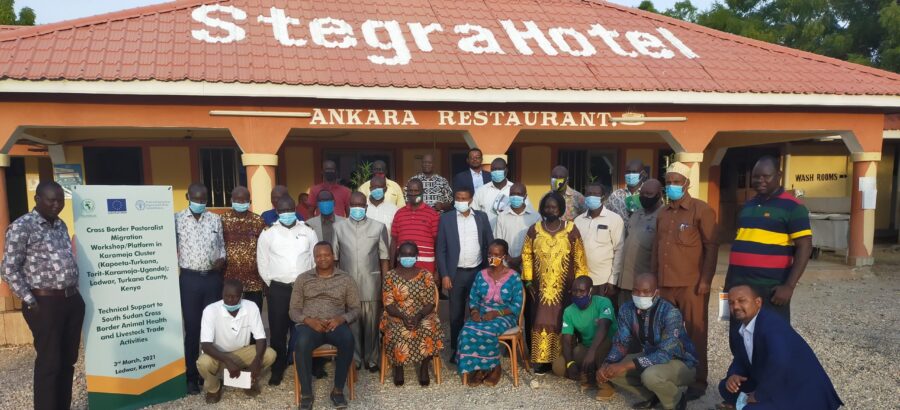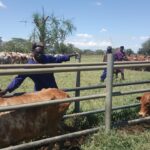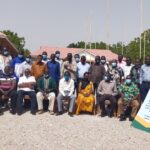Background
In Karamoja cluster (Kapoeta-Turkana, Torit-Karamoja-Uganda), one of the limiting factors is frequent drought that subjects pastoralists to migration in search of pasture and water for their livestock. They often leave only milking herds and young ones, especially cattle and camels, at homes to continue feeding their families. The frequent movement is sometimes uncoordinated and therefore contributes to conflict over scarce natural resources. This calls for dialogues; pre and post-migration, to mitigate the conflicts. The objective of the one day meeting was to review how pastoral mobility has contributed to conflict as well as the mitigation measures.
Opening Remarks
The one day meeting, held on 3 March 2021, was officially opened by the Director of Livestock Production, Ministry of Agriculture, Livestock, Fisheries and Cooperatives, Kenya. Welcome remarks were made by Dr. S. J. Muchina Munyua, Director of IGAD Center for Pastoral Areas and Livestock Development. Both reminded participants of the importance of the livestock sector to the economy and livelihoods of pastoral communities who navigate through unpredictable climate changes which contribute to increased drought frequency in the cluster. This forces pastoral mobility in the cluster in search of water, pasture and occasionally trade. The mobility in turn contributes to cattle rustling/ theft, spread of transboundary animal diseases, conflict over scarce natural resources, insecurity, wildlife/ domestic animals and human conflict among others. These occurrences led IGAD and Member States to come up with designated livestock migratory routes to inform investment (water dams, livestock markets, border posts), facilitated signing of Karamoja cluster MoU on cooperation and collaboration for control of transboundary animal diseases and sanitary measures, to promote cross-border trade. Other developed tools include informal cross-border trade framework, transhumance protocol and several other community peace agreements meant to foster peace during pastoral mobility.
Moreover, the cluster is endowed with lots of non-wood forest products (NWFP) such as artisanal minerals, gums and resins, which should be exploited with proper focus. The meeting was attended by 46 participants drawn from Ministries responsible for animal resources, customs, trade and peace building committees from Ethiopia, Kenya, South Sudan and Uganda as well as ICPALD.
Key Plenary Discussion Points
On IGAD efforts that promote cross-border migration in Karamoja cluster and IGAD region:
- IGAD transhumance protocol focuses on inter-regional migration and movements between IGAD Member States which is about 51%. The remaining 49% of migrants is towards Middle East and other countries. A number of the immigrants, economic and political, are illegal and therefore end up being abused. IGAD has counter-smuggling agreement with GCC countries to address such abuses. Moreover, GCC countries have established human counter-trafficking units to handle human trafficking and abuse.
On the status of cross-border pastoralist migration and mobility with livestock in search of water, pasture and trade; opportunities, challenges and recommendations going forward are:
- It will be good for Kenya and South Sudan to disarm cross-border communities the way Uganda has done in Karamoja region to foster peaceful migration by mobile pastoralists in search of water and pasture during dry periods. Kenya government has initiated disarmament among pastoral communities. Guns are only being given to trained police reservists for proper regulation and accountability.
- Mobile pastoralists in Turkana and West Pokot participated in designating migratory routes for escape during drought in search of water and pasture. The routes were designated without a focus on insecurity issues and investment along the routes. Pastoralists use safe routes to water and pasture even though insecurity such as cattle theft occurs among communities.
- Turkana County with support of development partners has mapped more tertiary migratory routes that feed into 14 IGAD mapped routs to enhance efficiency and increase safety and easy passage of mobile pastoralists. The mapped routes should be linked to formal routes in Uganda Karamoja districts for ease of regulating livestock movement. South Sudan should be assisted by IGAD to map their routes too. Mapping of migratory and trade routes informs decision makers and development partners on where to put infrastructure investments such as livestock markets, water facilities, promotion of fodder production, gazettement of border points, schools, health facilities among others, to support mobile pastoral communities.
- There is need to develop a regional livestock policy by the four countries with support of IGAD to regulate livestock movement. However, this is somehow addressed by IGAD transhumance protocol and road map.
- Domestic animals are occasionally permitted into national parks during severe drought in the four countries, otherwise, pastoralists are only allowed to cut and carry pasture for their livestock to mitigate disease transmission between wildlife and domestic animals.
- Roll out of livestock identification and traceability system in the cluster will help trace back of rustled and stolen animals.
- Livestock stolen by Karamojong from Turkana community is often recovered by UPDF and given back but whenever Turkana rustle or steal Karamojong livestock, Kenya government fails to recover and return to owners, an issue of concern if peace is to be maintained.
- Free movement of livestock to Uganda, all routes from Kenya and South Sudan head to Uganda, with migration often happening at night, yet transhumance certificates by IGAD stipulate that this should only happen during daytime. More awareness creation should be carried among mobile communities to adhere to required laws to mitigate cattle theft along the way as well as safety of pastoralists.
- The poor roads on Kenyan and South Sudan sides in Karamoja cluster often make recovery of rustled animals difficult, in addition to contributing to high cost of commodities from Uganda to Turkana or West Pokot. Internet coverage is also poor making mobile phone communication a challenge.
- IGAD should consider bringing cross-border communities from Ethiopia such as Nyangatom and Desanege into future peace building meetings since they are part of the source of conflict during migration.
- IGAD should integrate South Sudan in future resilient cross-border projects the way it has been integrated between Ethiopia, Kenya and Uganda under the World Bank funded project.
- The national extension staff in Uganda should guide pastoralists to harvest standing hay in forest and commercialize it by selling it to migrating pastoralists instead of burning it. They should be encouraged to utilize crop residues as well instead of it just going to waste.
- CAHWs are not legally recognized in Kenya and Uganda, therefore, they cannot be resourced by the government. However, development partners such as FAO, UNICEF, NGOs etc have always trained and equipped them for management of simple animal diseases among migrating communities in the cluster. They were useful in the eradication of rinderpest in the cluster in the early 20s.
- E-disease surveillance by community disease reporters (CDR) in Turkana provided with smart phones from all parts of the county has brought efficiency to disease monitoring and management. CDRs often send the information about any clinical manifestations to CDVS server for information and action.
- IGAD should be gender sensitive in extending invitations to future meetings. Only Uganda had female participants, a reason for concern for the future since women are very key in restoring peace after inter-marriages among cross-border communities.
- Pastoralist should be helped to keep fast maturing and high yielding livestock to realize better return on investment as compared to indigenous livestock that they currently keep.
- Transhumance protocol implementation mechanism – Focus on LITS and disarmament. Implementation will take time; originating from policy and sensitization at community for ownership. Movement travel within own country is allowed at night but border crossing is only during day time for recording purposes. This will reduce rustling, theft at community levels. Local agreements will be developed to guide time of cross border crossing.
- Pilot Kenya livestock insurance program is going on in 8 counties. The government is planning to roll it out in the whole country at partial subsidy of 50/50%.
- There are 120 holding grounds in Kenya that should be turned into productive land through PPP for feedlot establishment, most of them in Turkana County. This will mitigate livestock migration.
Recommendations
- Member States should work closely with IGAD to develop or improve the livestock support infrastructures along the designated stock routes such as water, markets, roads, health facilities, education facilities among others, to support mobile communities.
- MS and IGAD should strengthen or establish peace building structures considering the local indigenous agreements, national security organs, peace committees.
- IGAD and MS should promote pre- and post-migration peace dialogue mechanisms and facilitate communities’ participation in awareness creation regional events to mitigate conflicts over natural resources.
- IGAD should popularize the contents of the transhumance protocol and roadmap to regulatory authorities as well as cross-border communities.
- IGAD and MS should strengthen harmonized cross-border surveillance and vaccination against TADs in the whole cluster. Political dialogue between South Sudan and its neighbours should be promoted by IGAD.
- IGAD and Member States should establish fodder banks in the cluster along designated migratory routes to serve mobile pastoralists at a fee.
- Member States should facilitate disarmament or regulate ownership of small arms in the hands of police reservists.
- IGAD should work with South Sudan to map out migratory stock routes in consultation with cross-border communities.
- IGAD with MS should design cross-border programmes for resource mobilization to undertake coordinated interventions.
- Customs and revenue offices of the four countries should increase the number of official border stations along their borders served with livestock support utilities such as water and pasture to promote formal cross-border trade.






